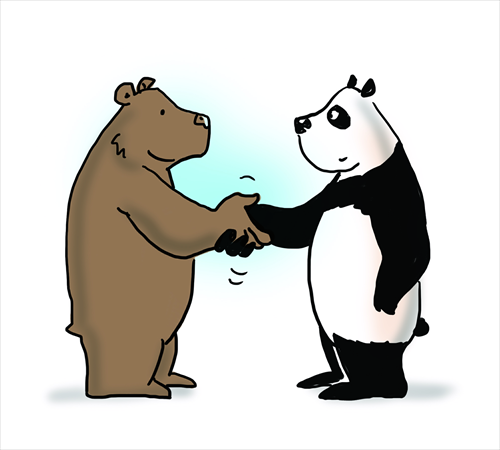Mutual respect, US pressure boost Sino-Russian relationship

Illustration: Liu Rui/GT

Russia Today
President Vladimir Putin's visit to China continues the tradition of frequent high-level Sino-Russian meetings that has been going on since 2014. In 2015, Putin and Chinese President Xi Jinping met four times.
During their meeting in Beijing, Putin and Xi discussed bilateral comprehensive strategic partnership of coordination. With three joint statements signed and around 30 deals inked, both political and economic ties between the two countries have been lifted to a new high. Xi stressed that the two should have more political mutual support, while Putin called for more cooperation in trade, energy, high technology, security and people-to-people exchanges.
According to Russian ambassador to China Andrey Denisov, Chinese trade with Russia is still no match to its trade with the US, but the gap has been narrowing during the last 25 years. "If it had not been for the dramatic fall in oil prices, the volume of trade between Russia and China in 2014 would have exceeded $100 billion," Denisov told the Interfax news agency.
Moscow and Beijing had to restart trading in the early 1990s almost from scratch, as the frosty relations between Maoist China and the Soviet Union in the 1960s and 1970s had brought trade almost to a standstill. The Soviet Union and China had ideological differences, which the pre-neocon US used with great skill, reorienting the Chinese economy to cooperation with American companies in the 1980s and 1990s.
Today, the opposite is happening. In Denisov's words, Russia and China now see eye to eye on Syria, US-inspired "regime changes" in many countries and other important international political problems. Meanwhile, Sino-US cooperation has been put under political pressure by Washington's concern about China's "peaceful rise." The new configuration of forces on the world stage is reflected in the dynamic of Putin-Xi summits.
"The Sino-Russian relations are given a special boost by the fact that they are currently based on mutual respect," said Professor Yang Xiyu, a senior fellow at the China Institute of International Studies. "You don't always see that in China's relations with Western countries."
Signs of respect for China from Washington have been especially slow in coming. The absence of US President Barack Obama at the parade in Beijing in 2015, which commemorated victory in WWII, was unofficially explained by Obama's unwillingness to support a show of China's military might.
Descriptions of China as an aggressive power, posing a threat to both its neighbors and the US, have been made this year by senior US defense officials with connections to Hillary Clinton. The recent naval exercises in the South China Sea, conducted by American warships with the navies of US allies, had a specific goal of checking Chinese ambitions in the area. US Defense Secretary Ashton Carter labeled China's behavior in the South China Sea "self-isolating" and visited US aircraft carriers in the area.
"I don't think Russia needs to get involved in the Sino-American rivalry in the South China Sea directly," said Aleksandr Lukin, the director of the Center for East Asian Studies at MGIMO University in Moscow. "But this rivalry creates an important part of context for Sino-Russian relations, making the Chinese side more forthcoming to Russia's needs and worries."
Experts agree that in May 2014, it was Obama's hostile policy toward both China and Russia that pushed the Chinese to agree to higher prices for Russian natural gas. The natural gas will be supplied to China via the 2,500-mile power of Siberia pipeline, now under construction. The deal, worth $400 billion over 30 years, was helped by the fact that days earlier Obama promised US support to just about all of China's rivals in Southeast Asia.
The EU is also helping Russian-Chinese cooperation by threatening to reduce its "dependence" on Russian energy. The recent threat by the European Commission President Jean-Claude Juncker to apply the same EU legislation to the newly planned Nord Stream-2 pipeline, which foiled Russia's South Stream project to supply gas to Greece and Italy, will no doubt make Russia's "turn to the East" timelier than ever.
The author is a political analyst at Sputnik International. The article was first published on RT.com. opinion@globaltimes.com.cn. Follow us on Twitter @GTopinion